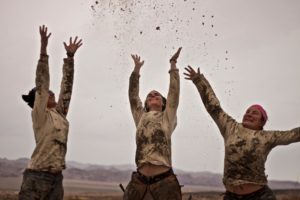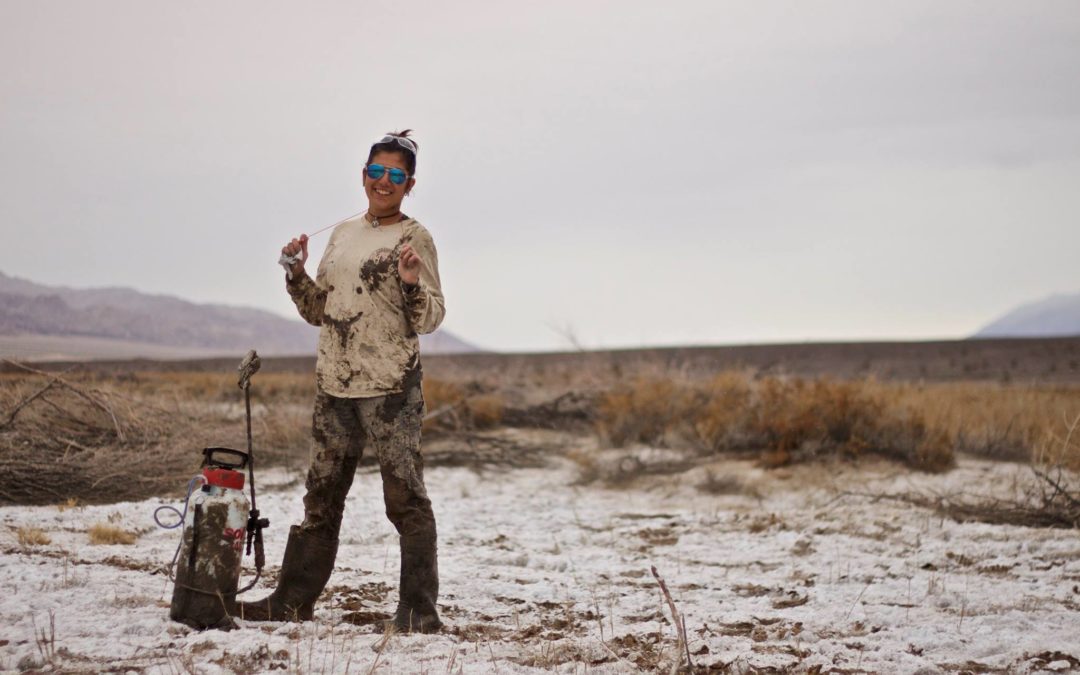Alumna Name: Demetria Toula Papadopoulos
Pronouns: She/Her/Hers
Dates Served: Feb 2015- May 2017 and May 2019- Present
What roles was Toula in: Crew Corpsmember, Crew Leader, Assistant Logistics Coordinator, Bureau of Land Management EPIC Internship (Currently Serving)
Location: Hurricane, Utah and St. George, Utah
ACE Alumna, Demetria Toula Papadopoulos, walks us through her journey with ACE. Toula started as an ACE corpsmember and years later is beginning her ACE EPIC Internship with the Bureau of Land Management. Continue reading below to learn more about her favorite projects, thoughts on leadership, where she is headed next and so much more!
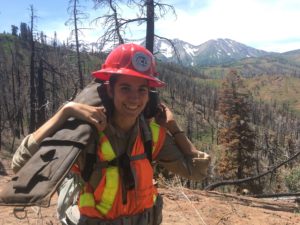
Q: What were you doing before ACE?
A: Before joining ACE, I was attending college at the School of the Museum of Fine Arts and working as a supervisor at a cafe in Boston, Massachusetts. I attended for three semesters and ended up having to leave for mental health reasons. I took the next year to continue to work, explore interests, and practice self-care. I eventually decided to pursue a long-time curiosity in Willing Workers On Organic Farms (WWOOF) and spent a month volunteering on an Orchard in California. I found that travel, meeting people, learning new skills, and working with the land fed my soul and left me feeling fulfilled and engaged. This period of exploration is what led me to work in the outdoors and eventually ACE.
Q: How did you hear about ACE?
A: Lots of Googling! I had actually been searching for ways to get experience volunteering with wildlife, but I was unsuccessful in finding something I could either afford to do or held enough prior experience for. ACE had shown up as a related option on www.coolworks.com. Even though the crew program was not directly related to wildlife work, I trusted that it could be a promising way to get a foot in the door of environmental work.
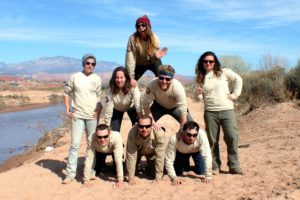
Q: Walk me through your time with ACE? What was your favorite aspect of being an ACE corps member?
A: Ok, I’m going to break this down by positions so it’s lengthy, but hopefully shows one pathway to outdoor work!
I began volunteering with ACE MTW in February 2015 and had originally signed up for a 3 month llong term. Ultimately, it passed in a flash and I ended up signing on for two more six month terms as a corpsmember. During my 15 months as a volunteer, I got trained as a sawyer, was selected for the flagship ACE Puerto Rico crew, became a housing supervisor, and participated in the early beginnings of the mentorship program and assistant crew leader position.
I was hired as a crew leader in May 2016 and led my first crew in Canyonlands National Park. I focused on chainsaw work and maintenance and mostly led restoration projects. The mentorship program really began to take off during this time and I was passionate about exploring leadership, empowering and teaching members. I eventually found it was time to move on in May 2017 and spent time traveling in New Zealand.
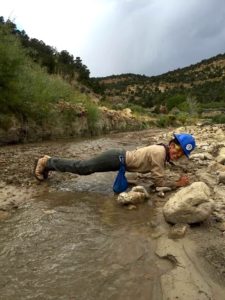
After returning to the states, I was hired as the Assistant Logistics Coordinator for MTW. This job combined the provisions and supplies position with vehicle/tool/shop upkeep. This was also the time where I received my Forest Service B Faller certification.
I found out about the opening for the EPIC position I currently hold during this time as well. It was with a project partner I had worked with previously and held a good relationship with. This is just one of the reasons ACE is SO valuable due to the connections you can make if you are invested. Ultimately, I am now working with the Bureau of the Land Management as an EPIC intern and working directly with wildlife.
Overall, I guess I would have to say one of my favorite aspects of working with ACE is community. I found a community of lifelong friends, mentors, resources, support, opportunities, on and on.
Q: What is ACE MTW culture? How do you feel you participated in that culture?
A: ACE MTW culture is very dynamic. I watched it change over and over during the two years or so that I lived in the Hurricane house. The smaller nature of MTW lends itself to a tight knit feel (kind of like a small town neighborhood where everybody knows everybody). But it also leaves room for interests and themes to blossom and shift so there were phases where everybody climbed, or learned card games, or played music, or gave mini learning sessions, baked cakes, practiced meditation, etc. If you had something to share, there was room to share it. Or if you wanted to learn something, there was a way to learn it. I really enjoyed watching groups of corps members come in and bring a totally new quality to the community. I like to think that as a crew leader, I supported the culture by creating an environment that encouraged others to explore their interests, take steps to teach each other, and just encourage creativity, sharing, and growth.
Q: What was it like living in Hurricane, Utah? Any favorite activities? Hikes? What did you do on your off days?
A: Hurricane is a pretty cool little place! All your basic needs are within walking distance from the ACE house. I especially loved reading in the park across the street, getting a coffee at River Rock and swimming in the Virgin River, or taking walks to the canyon just down the road. The city of St. George is a 25 minute drive in one direction and Zion National Park is a 25 minute drive the other way. It was also an eye opening experience being surrounded by an extremely different culture than what I was used to in the city/suburbs of Massachusetts.
I spent my off days taking road trips with other volunteers to nearby states and national parks. I also had a motorcycle while I was living at the house so I took lots of solo trips all over the southwest. I think these were some of my favorite experiences because I got to reach some beautiful places on my own and meet really interesting people along the way. While you could travel to other places, there is also ENDLESS hiking and hidden jems to be experienced locally. There was never a boring day at the ACE house either with lots of potlucks, jam sessions, game nights, etc.
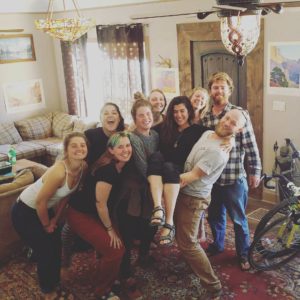
Q: Did you have a favorite project? Why?
A: Oddly enough, I feel like my favorite projects could be described as second hand fun haha. It’s the most challenging ones that I feel like I appreciate the most. I guess if I had to pick one, it would be crew leading the series of projects in Price, UT. It was a semi backcountry project in that our gear had to be brought in by UTV. It was also a restoration project so we hiked chainsaws to our worksite and faced an unbroken forest of tamarisk to remove. We faced so many challenges in those weeks from multiple flash flooding, to more work than we imagined, to groover (backcountry toilet) malfunctions, and facing crew dynamics. But somehow, I think/hope everybody there came out of it a little stronger. I also met some of my best friends through overcoming these hard moments (Linnea remembers…)
All this being said, it’s worth mentioning that there was always sufficient support, communication, and planning from staff, so we were able to avoid getting into situations that were out of hand.
Q: In what ways did ACE shape your life personally and professionally?
A: ACE was a huge step for me towards empowerment, learning invaluable skills, fulfilling my dream of travel, and what led me to take the job I currently hold. A big bonus for me also happened to be helping overcome social anxiety through being in a supportive space. Beginning as a shy art student, I left the crew program with self confidence, a sense of independence, and a deep appreciation of teamwork. The skills I gained in ACE are what led me to pursue a lifelong dream of traveling to New Zealand. I felt confident enough to travel solo, work and live on farms and communities, and volunteer with the Department of Conservation. In addition, maintaining communication with a project partner I connected with is ultimately what led me to my current internship with the Bureau of Land Management and working with wildlife.

Q: What is leadership to you? What did ACE teach you about leadership?
A: For me, leadership is less about directing people to do a job and more about watching and guiding the natural flow of a group towards their greatest potential. In ACE, I learned that I didn’t have to be the most charismatic, the most outgoing, or the loudest to be a good leader. I found my strengths in one on one connection and building relationships with individuals. I found that in listening to each other, we could build ties and be better, stronger, and more efficient as a team. In this way, we not only got the work done, but grew as individuals. While it often took being the one to step forward, make calls, and take action; for me, mentoring and being a good leader was also often about stepping back, observing, and facilitating the flow of magic.
Being in a leadership role, I learned the most about myself in the shortest amount of time because your actions echo. That being said, I don’t think that role has ever stopped and all of our actions are a small, daily act of leadership.

Q: What are your responsibilities as an EPIC Intern with St. George, Bureau of Land Management?
A: As an EPIC Intern with St. George, Bureau of Land Management, my responsibilities range from heavy field work with wildlife to data management. We work closely with the desert tortoise and most recently have been monitoring their population in the Red Cliffs National Conservation Area. This has been especially important due to the recent fires. The data we’ve collected will be used to help Federal Agencies make educated land management decisions. Our work with the desert tortoise also includes radio telemetry, tortoise releases, monitoring during construction in tortoise habitat, and scat collection for DNA studies to determine diet in different habitats. We’ve also conducted bat surveys using acoustic software, assessed Mexican spotted owl habitat, conducted plant surveys, and watered plants at habitat restoration sites. My favorite part of my job has to be Gila monster surveys. They are incredibly unique animals with fascinating behavior. Unfortunately, they’re facing population decline due to human related habitat loss/fragmentation and poaching so research is incredibly important now. In this job, I’ve really come to realize how every bit of effort in conservation is so vital even if your work feels small.

Q: How do you fill your time outside of your internship? What’s your favorite outdoor activity?
A: I still go hiking, camping, climbing and have recently gotten into mountain biking. I try to take my incredible adventure cat, Baloo, out for walks when I can and when he’s not busy being a couch potato. I’ve also been working on making more art through landscape painting and wildlife studies. I think my favorite outdoor activity is actually just sitting alone in one place and taking everything in. I like to find time during hikes to stop and sketch a landscape that calls to me. I never feel like I truly know a place until I do this.
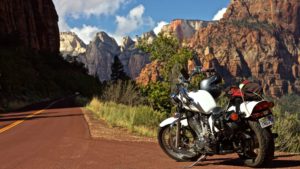
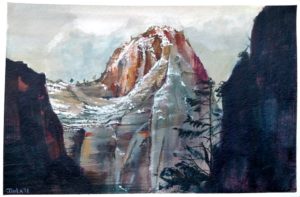
Q: What comes next? What are your future goals?
A: I plan on fulfilling this EPIC internship in St. George, and would love to apply for a position at the BLM as a federal employee if something opens up. I’m also taking online fisheries and wildlife management classes at Oregon State University at this time. Ultimately, I would still like to combine this work with art, leadership, and sustainability either in one job or through different realms of my life. I am passionate about sustainable agriculture as a tool for conservation and would love to find a way to merge these things. Who knows where exactly it will all lead in 30 years, but I’m confident that following passions one step at a time will get me somewhere in the end.
Q: If a prospective ACE member were to ask you what the benefits of joining ACE are, what would you say?
A: It’s hard to give a concrete answer but it is largely what you make of it. You are aboard an ocean of resources, chances upon chances to learn new skills, living in a household of people with both similar interests and different interests, a boundless landscape filled with beauty and adventure, you receive an education award, and you have the rare gift of time on your hands for six off days. These things are so hard to come by! Much of it really is up to you what you will do and what it equals out to in the end. But I suggest to be as proactive as you can, be flexible, be resilient, and be receptive.
In my ACE experience, I can tell you I have made the best- lifelong friends, experienced some of the most wonderous places, learned rare and valuable skills, gained invaluable job experience, met inspiring/powerful women and men who have served as huge role models, developed as a human, made lots of professional connections, and really would not be the same without it all.
